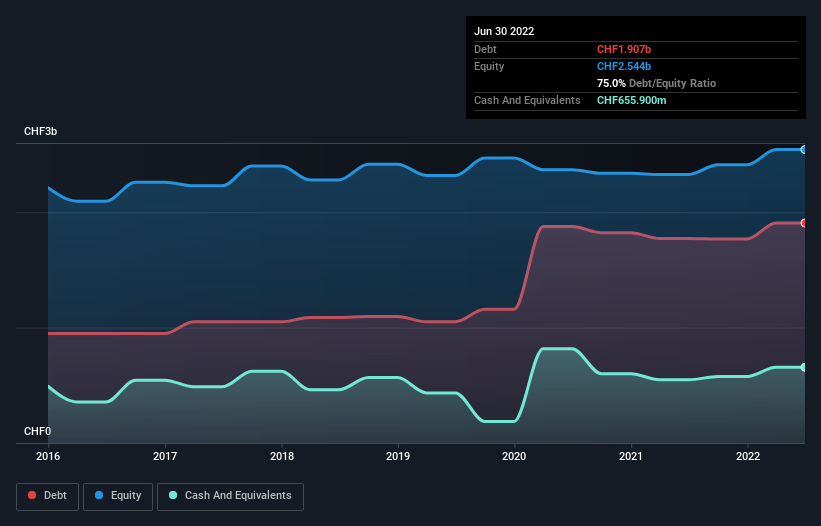- Switzerland
- /
- Infrastructure
- /
- SWX:FHZN
Here's Why Flughafen Zürich (VTX:FHZN) Can Manage Its Debt Responsibly

Some say volatility, rather than debt, is the best way to think about risk as an investor, but Warren Buffett famously said that 'Volatility is far from synonymous with risk.' When we think about how risky a company is, we always like to look at its use of debt, since debt overload can lead to ruin. Importantly, Flughafen Zürich AG (VTX:FHZN) does carry debt. But the more important question is: how much risk is that debt creating?
When Is Debt A Problem?
Generally speaking, debt only becomes a real problem when a company can't easily pay it off, either by raising capital or with its own cash flow. If things get really bad, the lenders can take control of the business. However, a more usual (but still expensive) situation is where a company must dilute shareholders at a cheap share price simply to get debt under control. Of course, the upside of debt is that it often represents cheap capital, especially when it replaces dilution in a company with the ability to reinvest at high rates of return. When we think about a company's use of debt, we first look at cash and debt together.
Check out our latest analysis for Flughafen Zürich
What Is Flughafen Zürich's Debt?
The image below, which you can click on for greater detail, shows that at June 2022 Flughafen Zürich had debt of CHF1.91b, up from CHF1.77b in one year. However, it also had CHF655.9m in cash, and so its net debt is CHF1.25b.

A Look At Flughafen Zürich's Liabilities
The latest balance sheet data shows that Flughafen Zürich had liabilities of CHF646.1m due within a year, and liabilities of CHF1.97b falling due after that. Offsetting this, it had CHF655.9m in cash and CHF242.6m in receivables that were due within 12 months. So its liabilities outweigh the sum of its cash and (near-term) receivables by CHF1.71b.
This deficit isn't so bad because Flughafen Zürich is worth CHF4.53b, and thus could probably raise enough capital to shore up its balance sheet, if the need arose. But it's clear that we should definitely closely examine whether it can manage its debt without dilution.
We measure a company's debt load relative to its earnings power by looking at its net debt divided by its earnings before interest, tax, depreciation, and amortization (EBITDA) and by calculating how easily its earnings before interest and tax (EBIT) cover its interest expense (interest cover). This way, we consider both the absolute quantum of the debt, as well as the interest rates paid on it.
Flughafen Zürich has a debt to EBITDA ratio of 2.9 and its EBIT covered its interest expense 6.5 times. This suggests that while the debt levels are significant, we'd stop short of calling them problematic. Notably, Flughafen Zürich made a loss at the EBIT level, last year, but improved that to positive EBIT of CHF158m in the last twelve months. The balance sheet is clearly the area to focus on when you are analysing debt. But it is future earnings, more than anything, that will determine Flughafen Zürich's ability to maintain a healthy balance sheet going forward. So if you're focused on the future you can check out this free report showing analyst profit forecasts.
Finally, a company can only pay off debt with cold hard cash, not accounting profits. So it's worth checking how much of the earnings before interest and tax (EBIT) is backed by free cash flow. Over the last year, Flughafen Zürich actually produced more free cash flow than EBIT. There's nothing better than incoming cash when it comes to staying in your lenders' good graces.
Our View
Flughafen Zürich's conversion of EBIT to free cash flow suggests it can handle its debt as easily as Cristiano Ronaldo could score a goal against an under 14's goalkeeper. But, on a more sombre note, we are a little concerned by its net debt to EBITDA. It's also worth noting that Flughafen Zürich is in the Infrastructure industry, which is often considered to be quite defensive. Looking at all the aforementioned factors together, it strikes us that Flughafen Zürich can handle its debt fairly comfortably. On the plus side, this leverage can boost shareholder returns, but the potential downside is more risk of loss, so it's worth monitoring the balance sheet. The balance sheet is clearly the area to focus on when you are analysing debt. But ultimately, every company can contain risks that exist outside of the balance sheet. For example - Flughafen Zürich has 1 warning sign we think you should be aware of.
If, after all that, you're more interested in a fast growing company with a rock-solid balance sheet, then check out our list of net cash growth stocks without delay.
New: AI Stock Screener & Alerts
Our new AI Stock Screener scans the market every day to uncover opportunities.
• Dividend Powerhouses (3%+ Yield)
• Undervalued Small Caps with Insider Buying
• High growth Tech and AI Companies
Or build your own from over 50 metrics.
Have feedback on this article? Concerned about the content? Get in touch with us directly. Alternatively, email editorial-team (at) simplywallst.com.
This article by Simply Wall St is general in nature. We provide commentary based on historical data and analyst forecasts only using an unbiased methodology and our articles are not intended to be financial advice. It does not constitute a recommendation to buy or sell any stock, and does not take account of your objectives, or your financial situation. We aim to bring you long-term focused analysis driven by fundamental data. Note that our analysis may not factor in the latest price-sensitive company announcements or qualitative material. Simply Wall St has no position in any stocks mentioned.
About SWX:FHZN
Excellent balance sheet second-rate dividend payer.

